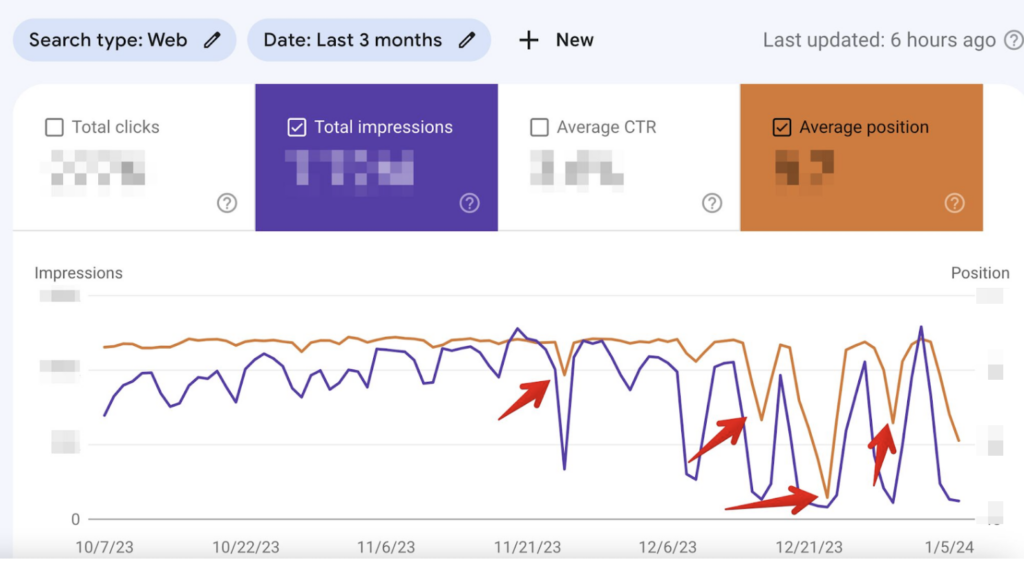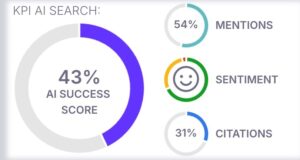Recently, we had a client with a very unusual problem.
On weekends, something strange kept happening – the website would COMPLETELY lose rankings and traffic. People couldn’t even find it when they searched for it by its name.
As if by the touch of a magic wand the rankings were coming back after the weekends.
But, here’s the fun part – it wasn’t just a one-time thing! The next week would come, and guess what? The same problem all over again. It was like a puzzle that kept repeating itself.
Just like magic, after each weekend’s trouble, the website would go back to its normal spot! It was like a cycle, happening again and again.
We noticed 9 websites facing the same puzzling situation.
So in the case of these 9 websites, the pattern was very clear. On these dates:
- 25 November
- 9th December
- 15th December
- 22-24th December (this one might be related to Christmas Eve though)
- 29-30th December
- 4-6th January
Were losing traffic and rankings COMPLETELY.
It’s like a mystery story – 9 websites, the same dates, weekends, and a magical cycle.
So what do we know about the issue so far?
- The problem occurred on the 25th of November.
- All the websites affected by “Weekend Ranking Mystery” felt into the following cycle:
- The website ranks normally.
- Massive traffic drop happens (during the weekends). The website stops ranking for ANYTHING event for exact match brand terms.
- The website goes back to its normal position after the weekends.
I have one more interesting point that connects all these websites affected by: “Weekend Ranking Mystery” – their domain extensions are similar. But before we go any further, let me show the evidence, in the form of screenshots from 9 aforementioned websites.
Update
Google confirmed this is a bug As a Google spokesperson said to Search Engine Land: “The issue has since been resolved, and the sites should no longer be seeing its effects”.
The evidence
Below, you will find 9 examples of websites that experienced MASSIVE drops in traffic/rankings on at least 5 out of six dates:
- November 25th
- December 8-9th
- December 15-17th
- December 20-24th (this drop can be explained by Christmas)
- December 29-31th
- January 4-7th
Most of the screenshots come from fellow SEOs and website owners, that’s the reason on why they aren’t “standardized”, but they still illustrate the issue well.
I case:

The chart above clearly shows that the average position has been dropping significantly during the weekends. I have learned from the website owner that on these days, the website stopped ranking for any keywords, contributing to the “Weekend Ranking Mystery.”
II case:
Here we observe the same fluctuations in average position during the same days.
III case:
This chart displays both clicks and impressions. The website was successfully gaining more traffic until November 25th, when it fell into the “Weekend Ranking Mystery”
IV case:
In the case of this website, we have a chart depicting ranking fluctuations. This website fell into a ranking trap a little bit later than other websites, on December 8th.
V case:
This is another website that experienced issues during all the aforementioned dates, from November 25th to the beginning of January.
VI case:
Same pattern as above. This website has been suffering from ranking fluctuations before, but after November 25th, it went to an extreme.
VII case:
This website’s ranking was stable for the last couple of months (as seen in the orange line), but then November 25th came, and the website fell into a ranking fluctuation trap.
VIII case:
This chart illustrates the average number of clicks over time. The website wasn’t very popular (before the “Weekend ranking mystery,” it was receiving around 100-150 clicks per day).
Then, regularly, Google started reducing its online visibility during the same dates as in the case of other examples.
IX case:
This is another interesting case – the website had a stable number of clicks. However, starting from November 25th, during the weekends, the website stopped ranking for brand terms, effectively putting it into the “Ranking fluctuation trap.”
Given that all 9 domains experienced drops in ranking, traffic, and impressions on the same dates, it’s highly unlikely to be a coincidence.
Adding an extra layer to the story, there is one more intriguing coincidence that I will discuss further in the article.
Another very interesting pattern
When I looked at these affected domains, all of them used non-standard domain extension.
9 out of 9 examples were non-standard TLDs, such as:
- .consultancy (example.consultancy)
- .care (example.care)
- .club
- .info
- .energy
How we can judge these websites?
Those websites aren’t groundbreaking, but they seem to provide solid value in their respective niches.
If Google can wipe off these websites, then it can happen to any business on the web.
Wild theory
I’ve linked these drops in traffic to recent reports about spam websites. Many, including Lily Ray, have observed a significant surge in spam content within Google Search results. This influx is partly due to Google being overwhelmed by AI-generated content. In the age of AI, it’s become much easier for individuals to create automated systems that flood Google with content, creating link connections among themselves, and more.
Google faces the challenge of dealing with these low-quality pages.
Did Google penalize these 9 websites because they were of low quality?
The answer is NO. However, there seems to be a connection, at least in my perspective.
Interestingly, all the affected domains had non-standard TLDs, such as .care and .consulting.
A similar situation occurred in the past, as reported in 2011. Back then, Google targeted various Polish regional domains through automated systems, arguing that these domains were inexpensive and often exploited by spammers.
Google assured that high-quality domains wouldn’t be affected, but in reality, many reputable websites were impacted as well. This could be closely related. Google might have observed that many spam websites use non-standard TLDs, often because they are more affordable than traditional .com domains, which are also already in use.
If Google has an automated system in place, it may inadvertently target other websites that are generally acceptable.
So, why only on weekends? Shutting down websites entirely would be a massive threat.
Google might have identified a loophole in the system – websites bombarding Google with automated spam. They can easily track spammy websites ranking high during weekdays and react accordingly.
However, on weekends, it appears they prefer to take down domains perceived as “risky”, and be more on a “safe side” cutting more domains than necessary, while ensuring their search results are not flooded by spam.
Of course, this is just a theory, but it seems like a plausible explanation. That’s why I’ve coined this as the “Google Weekend Ranking Mystery.” as this is the mystery that have to by solved by us, SEOs, and Google representatives.
FAQ:
Tomek, are you sure it’s a bug?
You can never be sure. However, there is a very strong pattern: 9 domains happen to experience a traffic drop at the same time. It’s not a “traditional” penalty, as the website comes back, then loses ranking again in a “vicious circle” during very predictable timeframes.
Tomek, isn’t this seasonal?
No, the pattern is clear. These websites stopped ranking even for their brands. They lost their position completely. It cannot be explained by seasonality, with one exception. Drops around the date of Christmas Eve can be explained by seasonality.
Tomek, I suffer from a similar ranking issue, what to do?
Send it my way. I will add it to a common document where I document similar cases. Write a short summary with dates of drops. Additionally, let me know if you see any anomalies in the links report in GSC (such as very few links reported).
Tomek, I’m experiencing some unusual ranking drops, but they are different from the ones you mentioned. What should I do?
First and foremost, ensure it’s not related to any of the following possibilities:
- No manual penalty
- No problems with cannibalization
- It’s not caused by indexing issues
- It’s not caused by JavaScript SEO issues
This is something I explain in the upcoming Google Search Console Mastery Course.
Once you ensure that there are no basic SEO mistakes:
- You can post your question on Google Search Console help forum.
- You can look for a similar pattern in the case of other websites managed by you or by fellow SEOs. Finding more examples like yours MAY indicate it’s a Google bug.
Wrapping up
Considering there are strong patterns of affected domains (they TOTALLY lose rankings during specifc dates, plus ALL affected domains are not standard TLDs), I consider it a Google bug or Google automated systems being too lax.
If you’re a Googler reading this article, feel free to reach out to me via Twitter or LinkedIn; I have collected all the domains in a single document for more convenience.
If you are experiencing a similar pattern, reach out to me, and I will add your website to my document and hopefully share it with Googlers.
I would love to hear your thoughts about the “Weekend Ranking Mystery.” I hope to solve it fully, and if it’s a Google bug, get the official confirmation from Google. For many websites solely reliant on traffic from Google to drive their business, this is the level of transparency we should expect from Google.
P.S. Kudos to all the people who helped me analyze the patterns, especially for my coworkers: Marcin and Paulina
Alice for noticing the problem and collecting the initial list of websites that dropped.
Pawel Gontarek, for telling me there are more examples like this shared on the Google group.
Tom Slaiter – for sharing his insights.
And obviously – to all the people who decided to publicly share their case.
P.S2: Soon, ZipTie will be integrated with Google Search Console so you will be able to notice traffic drops much easier!
Update!
Google confirmed this is a bug As a Google spokesperson said to Search Engine Land: “The issue has since been resolved, and the sites should no longer be seeing its effects”.



